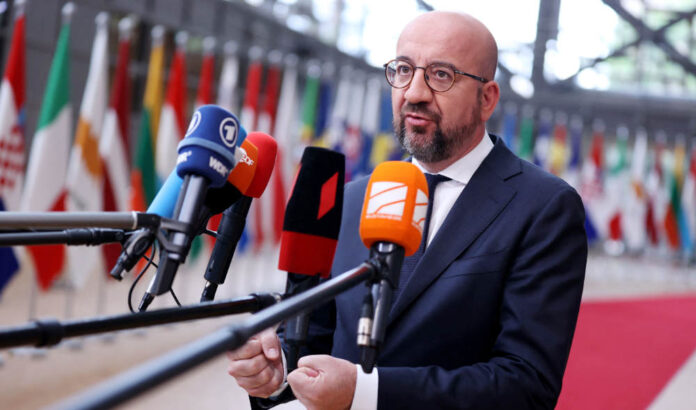KYIV/LVIV: EU leaders agreed on Monday to ban the export of Russian oil to the 27-nation bloc, EU Council President Charles Michel said, as Ukrainian and Russian forces battled on the outskirts of Sievierodonetsk, the last city still held by Kyiv in Ukraine’s strategic Luhansk province.
Michel said on Twitter the ban would immediately cover more than two thirds of oil imports from Russia “cutting a huge source of financing for its war machine.”
The EU leaders, meeting in Brussels, also agreed to cut off the largest Russian bank Sberbank from the SWIFT system and to ban three more Russian state-owned broadcasters, Michel added.
Shortly before the announcement, Ukrainian President Volodymyr Zelensky said the situation remained “extremely difficult” in the Donbas region, where Russia has focus of its military effort after failing to capture Ukraine’s capital, Kyiv, in March.
Zelensky had called the EU too soft on Moscow when it appeared leaders would not reach an agreement on the oil ban.
Earlier, in Washington, President Joe Biden said the United States would not send Ukraine rocket systems that can reach into Russia, a decision Russian Security Council Deputy Chairman Dmitry Medvedev called “rational.”
Russia has been seeking to seize the entire Donbas region, consisting of Luhansk and Donetsk, another province Moscow claims on behalf of separatist proxies.
Capturing Sievierodonetsk and its twin city Lysychansk on the opposite bank of the Siverskyi Donets river would give Moscow effective control of Luhansk and allow the Kremlin to declare some form of victory after more than three months of death and destruction in Ukraine.
But by focusing on a battle for the single small city, Russia could leave other territory open to Ukrainian counterstrikes.
In his nightly address, Zelensky said the Donbas situation “remains extremely difficult” and said the Russian army was “trying to gather a superior force to put more and more pressure on our defenders.”
“The Russian army has now gathered there the maximum combat power,” he said of Donbas as a whole.
Kyiv said that in recent days, its forces pushed back Russian troops to defensive positions in Andriyivka, Lozove and Bilohorka, villages on the south bank of the Inhulets River that forms the border of Kherson province, where Moscow is trying to consolidate control.
RUSSIAN SHELLING
Zelensky said Russian forces shelled the city of Kharkiv again on Monday, as well as the border region of Sumy, which was hit from inside Russia.
Russian shelling has reduced much of Sievierodonetsk to ruins, but the Ukrainian defense has slowed the wider Russian campaign across the Donbas region.
Luhansk governor Serhiy Gaidai said Russian troops had advanced into Sievierodonetsk’s southeastern and northeastern fringes, but Ukrainian forces had driven them from the village of Toshkivka to the south, which could frustrate a push to encircle the area.
“They use the same tactics over and over again. They shell for several hours — for three, four, five hours — in a row and then attack,” he said. “Those who attack die. Then shelling and attack follow again, and so on until they break through somewhere.”
With temperatures rising, there was a “terrible smell of death” on the outskirts of Sievierodonetsk, Gaidai said.
A French journalist, Frederic Leclerc-Imhoff of television channel BFM, was killed near Sievierodonetsk on Monday when shelling hit the vehicle he was traveling in during an evacuation of civilians. French Foreign Minister Catherine Colonna, who was visiting Ukraine, demanded an investigation.
The Kremlin said Russian President Vladimir Putin, in talks with Turkish President Tayyip Erdogan, said Russia was ready to facilitate unhindered grain exports from Ukrainian ports in coordination with Turkey.
Western leaders have chided Russia for blockading Ukrainian ports, sending prices of grain and other commodities soaring. The United Nations has said a global food crisis is deepening and has been trying to broker a deal to unblock Ukraine’s grain exports.
“Emphasis was placed on ensuring safe navigation in the Black and Azov seas and eliminating the mine threat in their waters,” the Kremlin said of Putin’s call with Erdogan.
Putin said if sanctions were lifted, Russia could export significant volumes of fertilizers and agricultural products.
Zelensky also spoke with Erdogan and said they discussed food security and defense cooperation, “and, of course, how to accelerate the end of this war.”
HUNGARY BLOCKING EU OIL EMBARGO
Efforts to agree an EU oil embargo has been blocked by Hungary’s refusal to agree to a ban on Russian imports it receives through the huge Soviet-era “Friendship” pipeline that runs across Ukraine.
Zelensky had questioned the lack of EU resolve.
“Why are you dependent on Russia … Why can Russia still earn almost a billion euros a day by selling energy?” he said in an address to EU leaders.
In the Netherlands, GasTerra, which buys and trades gas on behalf of the Dutch government, said it would no longer receive gas from Russia’s Gazprom from Tuesday.

